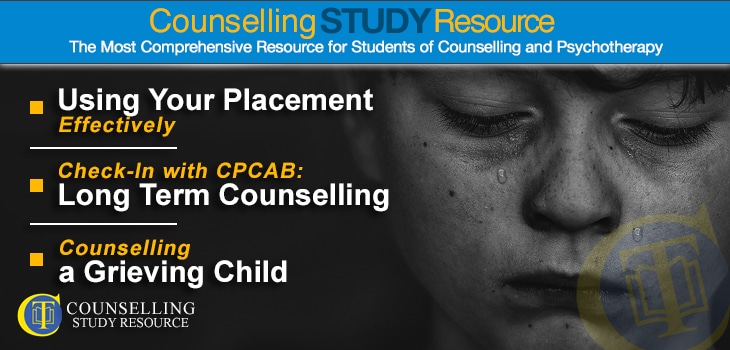139 - Counselling a Grieving Child
Using Your Placement Effectively - Long-Term Counselling
In episode 139 of the Counselling Tutor Podcast, Ken Kelly and Rory Lees-Oakes point out the many benefits of doing a counselling placement, beyond the obvious purpose of building your 100 hours' experience. 'Check-In with CPCAB' then covers working with a client long-term, and how this differs from the experience of providing short-term therapy. Finally, in 'Practice Matters', the presenters discuss child bereavement and how to prepare for counselling a grieving child ethically.
* BACPAC practice management software for counsellors and psychotherapists is a sponsor of the Counselling Tutor Podcast.
Get a 30-day free trial of BACPAC and a 30% discount by using the discount code CT2020
Using Your Placement Effectively (starts at 1.45 mins)
Rory and Ken list the many potential gains from making maximum use of your training placement in a counselling agency. These may include:
- building your network (of peers and those more experienced than you) as a way of identifying possible work opportunities and referral routes for the future
- understanding how counselling organisations operate, for example by spending time with staff to learn about their roles and responsibilities - and getting fully acquainted with the agency's policies and procedures
- participating in group supervision, as an environment to gain different perspectives from both peers and facilitators
- watching out for training resources and opportunities, which may be advertised on a noticeboard at your agency's premises
- getting ideas and collecting primary data for your research project.
Rory has written a handout on getting the most out of your counselling placement; this is available HERE.
Check-In with CPCAB: Long-Term Counselling (starts at 15.05 mins)
Some counselling agencies limit the number of sessions per client to six to 12; this way of working is very different from places where counselling can be long-term and even open-ended.
Rory talks to Ray van der Poel (Head of Business and Development) at CPCAB (Counselling & Psychotherapy Central Awarding Body) about the difference between short-term and long-term counselling, and what each asks of the therapist.
Ray describes an experience during his own counselling placement in which he built relational depth with a client, noting that he really noticed this depth after 18 sessions.
Long-term working - whilst being an immensely fulfilling experience for the long-term therapist - also brings its own potential hazards and challenges, for example in setting and holding appropriate boundaries and in monitoring self-disclosure in the counselling room.
Rory and Ray note the vital nature of clinical supervision in navigating this ethically and professionally.
Do listen out for a future discussion on the challenges of ending with a long-term client. In the meantime, you can find more information about CPCAB on its website. CPCAB is the UK's only awarding body run by counsellors for counsellors.
Counselling a Grieving Child (starts at 26.15 mins)
Evidence suggests that even babies and very young children experience grief following the death of a parent or sibling.
Working with bereaved children is a specialist area that Rory and Ken suggest needs additional CPD above your counselling practitioner qualification.
In particular, it is vital when counselling a grieving child to understand the stages of child development, as these relate closely to how children of different ages process their grief - for example the use of magical thinking by younger children.
Rory also emphasizes the importance of using 'clean' language, by which he means tailoring your vocabulary and ways of speaking about grief to the age and developmental stage of the child in order to ensure that they can easily understand what you mean.
When counselling a grieving child, it's important too to look out for transference and countertransference.
For example, as a counsellor, you may feel drawn to work in this field through your own experience of child bereavement.
If so, it's vital that you have processed your own grief as fully as possible, so that you are not drawn to over-identification with the client, possibly being unable to see this due to your own unprocessed grief.
Here in Counsellor CPD, you can watch this lecture on counselling bereaved children by Rory, who has himself completed specialist modules in this area.


